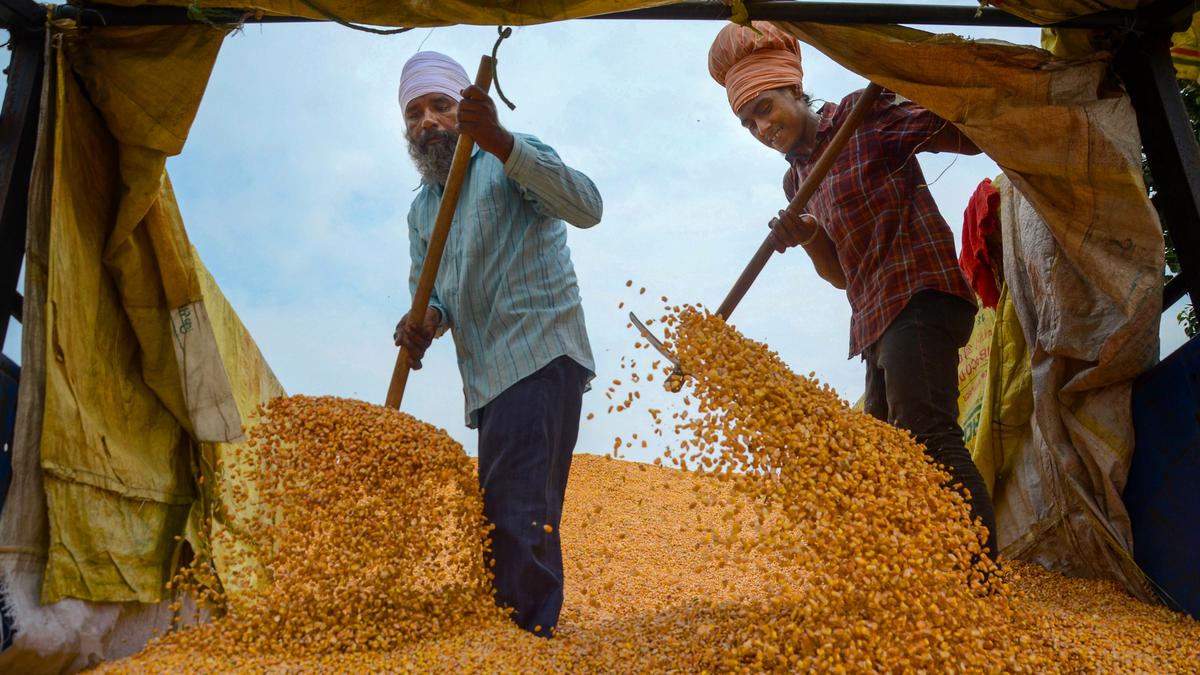
Punjab moves Supreme Court against Union for refusing to reimburse fees on food grains procurement
The Hindu
Punjab has filed a suit in the Supreme Court accusing the Union government of overstepping into the exclusive legislative competence of the State by insisting that the latter reduce its statutory charges.
Punjab has filed a suit in the Supreme Court blaming the Union of refusing to reimburse statutory charges — market fees and rural development fees (RDF) — levied by it on procurement of food grains on behalf of the Centre to ensure food security in the country.
“The defendant [Union of India] is refusing to pay the market fees and RDF even though it is validly imposed by the State under Article 246(3) of the Constitution as per State List of the Seventh Schedule,” Punjab’s suit filed through advocate Ajay Pal submitted.
The fees also includes for agricultural produce and markets and fairs. Punjab said it was the fulcrum of India’s agrarian and food economy and called the “food bowl of India”, contributing 21% of rice and 31% of wheat in the central food grains of the nation during 2021-2022.
The State said the RDF receivable outstanding from the Union at the rate of 3% of the MSP from crop years 2021-22 to 2023-24 was a total of ₹3,637.40 crore.
It said the market fees receivable outstanding from the Union at the rate of 3% of the MSP from crop years 2022-23 to 2023-24 was a total of ₹ 1514 crore.
The outstanding market fees from the Union allowed at the rate of 2% of the MSP from crop years 2022-23 to 2023-24 was a total of ₹943 crore.
The suit accused the Union of overstepping into the exclusive legislative competence of the State by insisting that the latter reduce its statutory charges.

“Writing, in general, is a very solitary process,” says Yauvanika Chopra, Associate Director at The New India Foundation (NIF), which, earlier this year, announced the 12th edition of its NIF Book Fellowships for research and scholarship about Indian history after Independence. While authors, in general, are built for it, it can still get very lonely, says Chopra, pointing out that the fellowship’s community support is as valuable as the monetary benefits it offers. “There is a solid community of NIF fellows, trustees, language experts, jury members, all of whom are incredibly competent,” she says. “They really help make authors feel supported from manuscript to publication, so you never feel like you’re struggling through isolation.”

Several principals of government and private schools in Delhi on Tuesday said the Directorate of Education (DoE) circular from a day earlier, directing schools to conduct classes in ‘hybrid’ mode, had caused confusion regarding day-to-day operations as they did not know how many students would return to school from Wednesday and how would teachers instruct in two modes — online and in person — at once. The DoE circular on Monday had also stated that the option to “exercise online mode of education, wherever available, shall vest with the students and their guardians”. Several schoolteachers also expressed confusion regarding the DoE order. A government schoolteacher said he was unsure of how to cope with the resumption of physical classes, given that the order directing government offices to ensure that 50% of the employees work from home is still in place. On Monday, the Commission for Air Quality Management in the National Capital Region and Adjoining Areas (CAQM) had, on the orders of the Supreme Court, directed schools in Delhi-NCR to shift classes to the hybrid mode, following which the DoE had issued the circular. The court had urged the Centre’s pollution watchdog to consider restarting physical classes due to many students missing out on the mid-day meals and lacking the necessary means to attend classes online. The CAQM had, on November 20, asked schools in Delhi-NCR to shift to the online mode of teaching.









